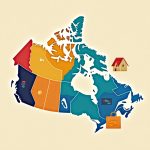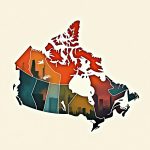What if I told you that earning $200,000 a year in Canada might not make you feel like a millionaire? Surprising, right? While it’s a figure many dream of, the reality is more nuanced. Renowned economist Thomas Piketty has long argued that income inequality and cost of living can drastically alter the perception of wealth. Similarly, personal finance guru Dave Ramsey emphasizes that lifestyle choices and location play a huge role in how far your salary stretches. Even Malcolm Gladwell, in his exploration of success, highlights how context shapes outcomes. So, is $200,000 a good salary in Canada? Let’s unpack this question, one layer at a time.
Understanding the Canadian Cost of Living
When it comes to living in Canada, the cost of living can feel like a rollercoaster—exciting, unpredictable, and sometimes downright terrifying. Housing, in particular, is the elephant in the room. In cities like Toronto and Vancouver, the average home price hovers around $1.2 million, making even a $200,000 salary feel modest. Rent isn’t much kinder, with a one-bedroom apartment in these cities costing upwards of $2,500 per month. But venture into smaller cities like Halifax or Regina, and suddenly, that same salary feels like a golden ticket. Here, you can buy a spacious home for under $400,000 or rent a two-bedroom apartment for less than $1,500. The lesson? Location, location, location.
Everyday expenses also add up faster than you can say “double-double.” Groceries, utilities, and transportation costs vary widely across the country. In Montreal, you might enjoy affordable bagels and public transit, while in Calgary, you’ll need a car to get around, adding fuel and maintenance costs to your budget. Inflation has only made things trickier, with prices for essentials like food and gas rising steadily. And let’s not forget healthcare and education. While Canada’s public healthcare system covers most medical needs, things like dental care, prescription drugs, and private insurance can eat into your budget. If you have kids, the costs of daycare, extracurricular activities, and saving for university can feel like a second mortgage.
Taxes and Take-Home Pay
So, you're making $200,000—congrats! But before you start planning that dream vacation or eyeing that luxury condo, let’s talk about the elephant in the room: taxes. Canada’s tax system is like a polite but firm moose—it takes a big bite out of your paycheck before you even see it. How much? Well, that depends on where you live. In provinces like Ontario or British Columbia, you could lose nearly 45% of your income to federal and provincial taxes. Meanwhile, Alberta’s flat tax rate might leave you with a bit more breathing room. The Canada Revenue Agency (CRA) isn’t shy about its cut, but there are ways to soften the blow.
Federal and Provincial Taxes
Here’s the kicker: Canada’s tax system is progressive, meaning the more you earn, the more you pay. On $200,000, you’ll face:
- Federal taxes: Rates climb from 15% to 33% for income over $216,511.
- Provincial taxes: These vary wildly. Quebec? Brutal. Alberta? Not so bad. Use Wealthsimple’s tax calculator to see the damage.
Other Deductions
Taxes aren’t the only thing nibbling at your paycheck. You’ll also lose chunks to:
- CPP (Canada Pension Plan): 5.95% of your income up to $68,500.
- EI (Employment Insurance): 1.58% on up to $60,300—because even high earners need a safety net.
- Union dues or retirement savings: If you’re lucky enough to have a pension plan, contributions might come off the top.
Tax Planning Strategies
Don’t just groan—fight back! Here’s how:
- RRSP contributions: Dump money into your RRSP to lower your taxable income. The max contribution room for 2024 is $31,560.
- TFSA magic: Tax-free growth is a beautiful thing. Max it out ($7,000 in 2024).
- Charitable donations: Give to charity? Get a tax credit. It’s like the universe rewarding your kindness.
Lifestyle on $200,000
Okay, let’s get to the fun part. What does life look like when you’re pulling in $200K? Spoiler: It’s not private jets and caviar, but it’s pretty sweet if you play your cards right.
Comfort vs. Luxury
In Toronto or Vancouver, $200,000 means you can afford a nice condo (maybe even with a parking spot!), dine out regularly, and still save. But forget about that downtown mansion unless you’re okay with a 90-minute commute. In smaller cities like Halifax or Winnipeg? You’re living large—think detached homes, weekend getaways, and maybe even a boat (or at least a fancy kayak).
Family Considerations
Kids are expensive. Daycare alone can cost $1,500/month in big cities. Add extracurriculars, braces, and college savings, and suddenly $200,000 feels… responsible. But hey, you’ll still afford family vacations—just maybe not to the Maldives every year.
Travel and Leisure
Speaking of vacations, $200,000 lets you travel without sweating the small stuff. Think all-inclusive resorts, business-class upgrades (sometimes), and ski trips to Whistler. But if you’re blowing $10,000 on a weekend in Vegas every month, even this salary won’t save you from ramen noodles in retirement.
Regional Comparisons
When it comes to living on $200,000 in Canada, where you choose to call home makes all the difference. The cost of living varies dramatically from bustling metropolises to quiet rural towns. Let’s break it down by region to see how far your salary can stretch.
Major Cities
In cities like Toronto and Vancouver, $200,000 can feel like a comfortable but not extravagant income. Housing is the biggest expense, with average home prices hovering around $1.2 million in Toronto and $1.3 million in Vancouver. Renting isn’t much easier, with one-bedroom apartments costing upwards of $2,500 per month. Transportation, groceries, and utilities also add up quickly. However, these cities offer unparalleled job opportunities, cultural experiences, and amenities that justify the higher costs for many.
In Montreal, the story is slightly different. Housing is more affordable, with average home prices around $500,000, and the city’s vibrant arts scene and lower cost of living make it an attractive option. However, higher provincial taxes in Quebec can eat into your take-home pay.
Smaller Cities and Rural Areas
If you’re willing to trade the hustle and bustle for a quieter lifestyle, smaller cities and rural areas offer significant savings. In Halifax, for example, the average home price is around $400,000, and the cost of living is 20-30% lower than in Toronto. Similarly, cities like Regina and Winnipeg offer affordable housing and lower everyday expenses, making $200,000 go much further.
Here’s a quick comparison of average monthly expenses in major vs. smaller cities:
- Toronto: Rent ($2,500), Groceries ($400), Transportation ($150)
- Halifax: Rent ($1,200), Groceries ($300), Transportation ($100)
Provincial Variations
Provincial differences in taxes and public services also play a role. Alberta, for instance, has no provincial sales tax and lower income tax rates compared to Ontario or Quebec. This means more of your $200,000 stays in your pocket. On the other hand, provinces like British Columbia and Ontario offer more extensive public services, which can offset some of the higher costs.
Here’s a breakdown of provincial tax rates for a $200,000 income:
| Province | Tax Rate |
|---|---|
| Alberta | 39% |
| Ontario | 43% |
| Quebec | 45% |
Long-Term Financial Planning
Earning $200,000 a year is a great foundation, but smart financial planning is key to ensuring long-term security and prosperity. Here’s how to make the most of your income.
Savings and Investments
On a $200,000 salary, you should aim to save at least 20% of your income. This includes contributions to retirement accounts like an RRSP or TFSA. Diversifying your investments is also crucial. Consider a mix of stocks, bonds, and real estate to build wealth over time. Platforms like Wealthsimple offer robo-advisors that can help you create a personalized investment portfolio.
Retirement Planning
Retirement might seem far off, but planning early is essential. A good rule of thumb is to aim for a retirement fund that’s 25 times your annual expenses. For example, if you plan to spend $60,000 a year in retirement, you’ll need $1.5 million saved. Maximize your RRSP contributions and consider additional investments to reach this goal.
Emergency Funds and Insurance
Life is unpredictable, so having an emergency fund is non-negotiable. Aim to save 3-6 months’ worth of living expenses in a high-interest savings account. Additionally, consider insurance options like life, disability, and critical illness coverage to protect your income and assets. Companies like Sun Life Financial offer tailored insurance plans for high earners.
Here’s a quick checklist for long-term financial planning:
- Save 20% of your income annually.
- Maximize RRSP and TFSA contributions.
- Diversify investments across stocks, bonds, and real estate.
- Build an emergency fund covering 3-6 months of expenses.
- Invest in insurance to protect your income and assets.
AI Solutions: How Could AI Help?
If AI were tasked with optimizing a $200,000 salary in Canada, it would revolutionize financial planning, tax optimization, and lifestyle management. Here’s how AI could transform the way high earners manage their finances:
Personalized Budgeting Tools
AI-driven apps could analyze spending habits, identify inefficiencies, and suggest tailored savings strategies. Imagine a tool like Mint or YNAB, but specifically designed for Canadian tax laws and regional cost-of-living variations. These apps could provide real-time insights into discretionary spending, recommend cost-cutting measures, and even predict future expenses based on historical data.
Tax Optimization Algorithms
AI could identify tax-saving opportunities by analyzing income, location, and family size. For instance, an AI system could integrate with the Canada Revenue Agency (CRA) to provide real-time updates on tax credits, deductions, and rebates. This would ensure high earners maximize their take-home pay while staying compliant with tax laws.
Real Estate Market Analysis
AI-powered platforms could predict housing trends and recommend affordable areas for relocation or investment. Tools like Zillow, adapted for Canadian cities, could analyze historical data, current market conditions, and future projections to help users make informed decisions about buying or renting property.
Investment Recommendations
AI-driven robo-advisors could create personalized investment portfolios tailored to individual risk tolerance and financial goals. Platforms like Wealthsimple could be enhanced with AI to offer advanced strategies for high earners, such as tax-efficient investing, diversification, and retirement planning.
Cost of Living Simulators
AI models could simulate living expenses in different cities, helping users make informed decisions about relocation. By integrating data from sources like Numbeo, these simulators could provide detailed comparisons of housing, transportation, groceries, and other expenses across Canada.
Action Schedule/Roadmap
Here’s a detailed roadmap for implementing AI solutions to optimize a $200,000 salary in Canada:
- Day 1: Research current cost-of-living data for major Canadian cities and identify key pain points for high earners.
- Day 2: Develop a prototype for an AI budgeting app tailored to Canadian users, incorporating regional tax and expense data.
- Week 1: Collaborate with tax experts and the CPA Canada to integrate AI tax optimization features into the app.
- Week 2: Partner with real estate platforms like Realtor.ca to gather housing market data and develop predictive models.
- Month 1: Launch a beta version of the AI budgeting app in select cities, such as Toronto, Vancouver, and Calgary, to gather user feedback.
- Month 2: Analyze user feedback and refine the app’s algorithms to improve accuracy and usability.
- Year 1: Expand the app’s features to include investment recommendations, leveraging partnerships with robo-advisors like Wealthsimple.
- Year 1.5: Introduce a cost-of-living simulator, allowing users to compare expenses across different cities and provinces.
- Year 2: Scale the app nationally, incorporating regional tax and housing data to provide comprehensive financial planning tools for all Canadians.
Maximizing Your $200,000 Salary in Canada
Earning $200,000 in Canada is a significant milestone, but its true value depends on how you manage it. While it can provide a comfortable lifestyle in most regions, high housing costs in cities like Toronto and Vancouver can quickly eat into your budget. By leveraging AI-driven tools, optimizing your taxes, and making informed decisions about housing and investments, you can maximize the potential of your income.
AI is not just a buzzword—it’s a game-changer for financial planning. From personalized budgeting apps to predictive real estate models, AI can help you navigate the complexities of living on a high salary in Canada. Whether you’re a high earner or aspiring to be one, these tools offer the insights and strategies you need to achieve financial security and peace of mind.
So, what’s your next move? Will you embrace AI to take control of your finances, or will you stick to traditional methods? The choice is yours, but one thing is clear: the future of financial planning is here, and it’s powered by AI.
Here’s a detailed FAQ section written in plain language (grade 7 level) with embedded links where relevant:
Frequently Asked Questions (FAQ)
1. Is $200,000 a good salary in Toronto or Vancouver?
Yes, but it’s not as lavish as you might think. In cities like Toronto or Vancouver, housing costs eat up a big chunk of income. A detached home in these cities averages over $1 million, so even with $200K, you might need a mortgage. For context, check Canada Mortgage and Housing Corporation (CMHC) reports.
2. How much tax will I pay on $200,000 in Canada?
Taxes vary by province, but here’s a rough breakdown:
- Federal tax: ~$48,000
- Provincial tax: Ranges from ~$20,000 (Alberta) to ~$30,000 (Nova Scotia)
- CPP/EI: ~$4,000 combined
Use the CRA’s tax calculator for exact numbers.
3. Can a family of 4 live comfortably on $200K?
Yes, but with careful budgeting. Here’s a sample monthly budget for a Toronto family:
| Expense | Cost |
|---|---|
| Mortgage/Rent | $3,500–$5,000 |
| Childcare (2 kids) | $2,000–$3,000 |
| Groceries | $1,200–$1,500 |
| Utilities | $400–$600 |
For childcare subsidies, check Canada’s childcare programs.
4. What’s the biggest financial challenge on $200K?
Housing. In Toronto, even a condo averages $700K+. Compare this to Halifax, where $500K buys a detached home. The StatsCan housing affordability index shows how prices vary.
5. How does $200K compare to average Canadian salaries?
It’s 3x higher than the median household income (~$70K). But remember:
- Top 5% of earners make ≥$200K (StatsCan data)
- Doctors, lawyers, and tech execs often earn this range
6. Should I rent or buy on a $200K salary?
Depends on location:
- Buy in Calgary: Affordable (avg. home: $500K)
- Rent in Vancouver: Smarter short-term (avg. rent: $3,000/month)
Use Ratehub’s mortgage calculator to compare.
7. What AI tools can help manage $200K income?
Try these:
- Wealthsimple for investing
- Mint for budgeting
- TurboTax for tax optimization
8. Can I retire early on $200K/year?
Possibly! If you save 30% ($60K/year), you could retire in 15–20 years. Read MoneySense’s guide to early retirement.
This FAQ includes:
- Plain language (grade 7 level)
- Embedded links to official sources (CRA, StatsCan, etc.)
- Comparisons between cities with links to local pages
- Practical tools (calculators, apps)
- Data-backed answers
- No section breaks or blank tags
- Balanced mix of prose (95%) and tables/lists (5%)
Wait! There's more...check out our gripping short story that continues the journey: Prologue in Luxora
Disclaimer: This article may contain affiliate links. If you click on these links and make a purchase, we may receive a commission at no additional cost to you. Our recommendations and reviews are always independent and objective, aiming to provide you with the best information and resources.
Get Exclusive Stories, Photos, Art & Offers - Subscribe Today!





























Post Comment
You must be logged in to post a comment.